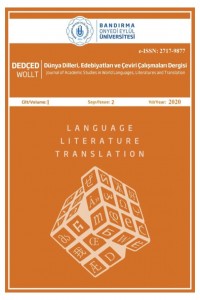“Ağlardan Kurtulma” Olarak Gönüllü Sürgünlük: James Joyce’un Ulysses Romanındaki Sürgün Motifi ve Sürgünün Metaforik Dili Olarak Çeviri
Abstract
Keywords
References
- Bartolini, P. (2008). On the Cultures of Exile, Translation, and Writing. West Lafayette, Ind.: Purdue University Press.
- Benjamin, W. (2008). Çevirmenin Görevi. (A. Cemal Çev.). Çeviri Seçkisi II: Çeviribilim Nedir?. İstanbul: Sel Yayıncılık.
- Brooke-Rose, C. (1996). Exsul. Poetics Today, 17(3), Creativity and Exile: European/American Perspectives I, pp. 289-303
- Buruma, I. (2001). Real Wounds, Unreal Wounds. The Romance of Exile. The New Republic (Feb. 12, 2001), pp. 33-38.
- Guillén, C. (1976). On the Literature of Exile and Counter-Exile. Books Abroad. 50(2), pp. 271-280. Ellmann, R. (2012). James Joyce: Hayatı ve Eserleri. İstanbul: Kabalcı Yayınları.
- Homeros. (2013). Odysseia. (A. Erhat Çev.). İstanbul: İş Bankası Yayınları.
- Joyce, J. (2012). Ulysses. (A. Ekici Çev.). İstanbul: Norgunk yayınclık.
- Joyce, J. (2016). Sanatçının Bir Genç Adam Olarak Portresi. (M. Belge Çev.). İstanbul: İletişim.
- Buruma, I. (2003). Real Wounds, Unreal Wounds: The Romance of Exile. New Republic 224: (1-10).
- Kishlansky, M. A., Geary, P. J., & O'Brien, P. (2008). Civilization in the West. New York: Pearson Longman.
- Said, E. (2012). “Sürgün üzerine düşünceler”. Sürgün Üzerine Düşünceler. Ankara: Hece Yayınları.
- Steiner, G. (1971). Extraterritorial: Papers on Literature and Language Revolution. New York: Athenaum.
- Wawrzyck, J. Introduction: Translatorial Joyce. JQ, 47(4).
Voluntary Exile As “Getting Off The Hooks”: Exile Motif And Translation As A Metaphorical Language Of Exile In James Joyce’s Ulysses
Abstract
Edward Said, in his essay “Thoughts on exile,” famously describes our age as “the age of refugees, displaced persons, and cultural migrations” (2015:188). Indeed, we are going through a time when exile is a personal reality for some people and a social reality that has become mandatory for others. Although it contains deprivation, loss, pain, and sadness, the exile motif has been used as one of the motifs of interest in literature from the ancient period to the present day. Many writers and poets, from Ovidius to Dante and Joyce to Nâzım Hikmet, lived a life of voluntary or compulsive exile and managed to turn this situation into the product of their creative genius. As a result of the technological progress brought about by modernity, along with the revolutionary developments in the field of transportation, the concepts of travel, exile, and dislocation have undergone major changes and become a rich motif in modernist literature. Being written in a voluntary exile, James Joyce's Ulysses, one of the most famous texts of modernist literature, stands out as one of the interesting examples of coexistence between exile and literary creativity for centuries. In addition, the definition of “translated culture” used to describe the age of exile and metaphors such as exile, hybridity, otherness attributed by post-colonial theories to translation draw attention to the close relationship between “exile” and “translation”. We can metaphorically relate translation that symbolizes a transition between different national languages, cultural discourses, different categories of time and space, and movement, as Walter Benjamin put it, the transition “to the other side,” to the state of exile. Like the state of exile, translation involves forced assimilation and strives for perching itself into the local, to find a new voice, a new identity, and expression there. After drawing a historical and critical general framework of the exile motif that motivated the author's creativity, the purpose of this study is to demonstrate the relationality between literature and translation and the state of exile that Joyce physically experienced and employed in Ulysses.
References
- Bartolini, P. (2008). On the Cultures of Exile, Translation, and Writing. West Lafayette, Ind.: Purdue University Press.
- Benjamin, W. (2008). Çevirmenin Görevi. (A. Cemal Çev.). Çeviri Seçkisi II: Çeviribilim Nedir?. İstanbul: Sel Yayıncılık.
- Brooke-Rose, C. (1996). Exsul. Poetics Today, 17(3), Creativity and Exile: European/American Perspectives I, pp. 289-303
- Buruma, I. (2001). Real Wounds, Unreal Wounds. The Romance of Exile. The New Republic (Feb. 12, 2001), pp. 33-38.
- Guillén, C. (1976). On the Literature of Exile and Counter-Exile. Books Abroad. 50(2), pp. 271-280. Ellmann, R. (2012). James Joyce: Hayatı ve Eserleri. İstanbul: Kabalcı Yayınları.
- Homeros. (2013). Odysseia. (A. Erhat Çev.). İstanbul: İş Bankası Yayınları.
- Joyce, J. (2012). Ulysses. (A. Ekici Çev.). İstanbul: Norgunk yayınclık.
- Joyce, J. (2016). Sanatçının Bir Genç Adam Olarak Portresi. (M. Belge Çev.). İstanbul: İletişim.
- Buruma, I. (2003). Real Wounds, Unreal Wounds: The Romance of Exile. New Republic 224: (1-10).
- Kishlansky, M. A., Geary, P. J., & O'Brien, P. (2008). Civilization in the West. New York: Pearson Longman.
- Said, E. (2012). “Sürgün üzerine düşünceler”. Sürgün Üzerine Düşünceler. Ankara: Hece Yayınları.
- Steiner, G. (1971). Extraterritorial: Papers on Literature and Language Revolution. New York: Athenaum.
- Wawrzyck, J. Introduction: Translatorial Joyce. JQ, 47(4).
Details
| Primary Language | Turkish |
|---|---|
| Journal Section | Research Articles |
| Authors | |
| Publication Date | December 30, 2020 |
| Submission Date | December 1, 2020 |
| Published in Issue | Year 2020 Volume: 1 Issue: 2 |


